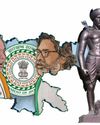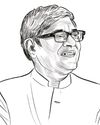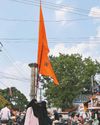It has taken 25 years for India to break out of its moral duplicity regarding Israel. West Asia has changed, so have Indian priorities that demand realpolitik.

PRIME Minster Narendra Modi’s visit to Israel from July 4-6 is a first by an Indian head of government. Israeli premier Benjamin Neta-nyahu flew down from Jerusalem, breaking protocol, to warmly receive Modi. It culminates a process that began 25 years ago, when P.V. Narasimha Rao recalibrated Indian foreign policy to the post-Cold War world. It would be useful to capture the evolution of bilateral relations.
In 1991, when Rao assumed office, he faced an empty treasury, a limping economy and India’s all weather friend, the Soviet Union, imploding. Post the fall of the Berlin Wall, the world moved from a bipolar balance to US hegemony. Francis Fukuyama declared the end of history, implying victory of the Western liberal order. The US’ 1991 intervention in the Gulf, to successfully eject Saddam Hussein from Kuwait, confirmed the new unipolar global order. It then turned to settle the lingering Israel-Palestine dispute. The Madrid Peace Conference was jointly convened by the US and Russia on October 30-November 1, 1991. Jordan, Lebanon, Syria and Palestine were invited to participate and engage with Israel. For the first time, Palestinians sat face-to-face with Israelis, albeit as part of the Jordanian delegation.PM Narasimha Rao began reshaping not only the Indian economy but India’s foreign policy too. Improving relations with the US was a pre-condition to his success. The US conveyed that post the Madrid Conference, invitees to the political sub-group meeting, to be chaired by US, needed diplomatic ties with all participants. India, historical cheerleader for Palestinian rights, could not attend even as an observer without full diplomatic ties with Israel. Sometime in October-November, when I was director (West Asia and North Africa), Foreign Secretary J.N. Dixit’s office sought drafting of a cabinet note to facilitate this.
This story is from the {{IssueName}} edition of {{MagazineName}}.
Start your 7-day Magzter GOLD free trial to access thousands of curated premium stories, and 9,000+ magazines and newspapers.
Already a subscriber ? Sign In
This story is from the {{IssueName}} edition of {{MagazineName}}.
Start your 7-day Magzter GOLD free trial to access thousands of curated premium stories, and 9,000+ magazines and newspapers.
Already a subscriber? Sign In

Trump's White House 'Waapsi'
Donald Trump's victory in the US presidential election may very well mean an end to democracy in the near future

IMT Ghaziabad hosted its Annual Convocation Ceremony for the Class of 2024
Shri Suresh Narayanan, Chairman Managing Director of Nestlé India Limited, congratulated and motivated graduates at IMT Ghaziabad's Convocation 2024

Identity and 'Infiltrators'
The Jharkhand Assembly election has emerged as a high-stakes political contest, with the battle for power intensifying between key players in the state.

Beyond Deadlines
Bibek Debroy could engage with even those who were not aligned with his politics or economics

Portraying Absence
Exhibits at a group art show in Kolkata examine existence in the absence

Of Rivers, Jungles and Mountains
In Adivasi poetry, everything breathes, everything is alive and nothing is inferior to humans

Hemant Versus Himanta
Himanta Biswa Sarma brings his hate bandwagon to Jharkhand to rattle Hemant Soren’s tribal identity politics

A Smouldering Wasteland
As Jharkhand goes to the polls, people living in and around Jharia coalfield have just one request for the administration—a life free from smoke, fear and danger for their children

Search for a Narrative
By demanding a separate Sarna Code for the tribals, Hemant Soren has offered the larger issue of tribal identity before the voters

The Historic Bonhomie
While the BJP Is trying to invoke the trope of Bangladeshi infiltrators”, the ground reality paints a different picture pertaining to the historical significance of Muslim-Adivasi camaraderie